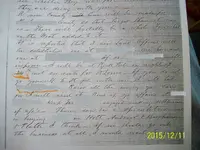L.C. BAKER
Silver Member
- Joined
- Sep 9, 2012
- Messages
- 3,805
- Reaction score
- 4,644
- Golden Thread
- 0
- Location
- Nebraska City, Nebraska
- Primary Interest:
- Other
- #1
Thread Owner
In March of 1857, the United States Supreme Court, led by Chief Justice Roger B. Taney, declared that all blacks -- slaves as well as free -- were not and could never become citizens of the United States. The court also declared the 1820 Missouri Compromise unconstitutional, thus permitting slavery in all of the country's territories.
K.G.C. officials (Supreme Knights) traveled for weeks to attend this trial, it is one of the ways we identified one of the Knights that we uncovered. If you suspect someone in your local 1857 legislature of being in the K.G.C. and can obtain his travel records, see if they traveled to St.Luis during the trial. The Supreme Court ruling was handed down on March 6, 1857, just two days after Buchanan's inauguration.
Perhaps the most immediate business consequence of the decision was to help trigger the Panic of 1857. Uncertainty about whether the entire West would suddenly become either slave territory or engulfed in combat like Bleeding Kansas immediately gripped the markets. The east/west railroads collapsed immediately (although north/south-running lines were unaffected), causing, in turn, the near-collapse of several large banks and the runs that ensued. What followed these runs has been called the Panic of 1857.
Was the country in the clutches of the Knights of the Golden Circle in 1857?
think about it, L.C. Baker
K.G.C. officials (Supreme Knights) traveled for weeks to attend this trial, it is one of the ways we identified one of the Knights that we uncovered. If you suspect someone in your local 1857 legislature of being in the K.G.C. and can obtain his travel records, see if they traveled to St.Luis during the trial. The Supreme Court ruling was handed down on March 6, 1857, just two days after Buchanan's inauguration.
Perhaps the most immediate business consequence of the decision was to help trigger the Panic of 1857. Uncertainty about whether the entire West would suddenly become either slave territory or engulfed in combat like Bleeding Kansas immediately gripped the markets. The east/west railroads collapsed immediately (although north/south-running lines were unaffected), causing, in turn, the near-collapse of several large banks and the runs that ensued. What followed these runs has been called the Panic of 1857.
Was the country in the clutches of the Knights of the Golden Circle in 1857?
think about it, L.C. Baker







